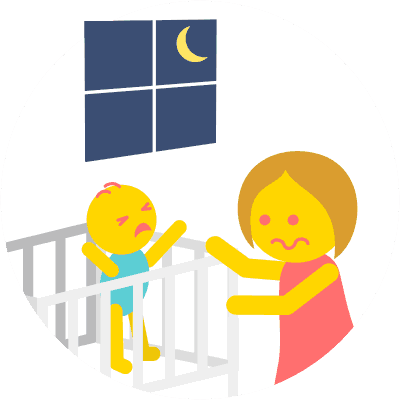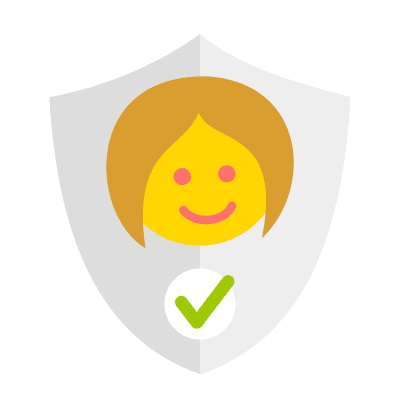Overnight Babysitting Tips (What to Bring, Prepare, and Expect)


Written & Illustrated by
Matthew James Taylor
Kidsit Founder, General Manager

Babysitting video by
Lydia Kutz
Babysitter, Infant Swimming Resources Instructor

Medically Reviewed by
Gina Maria Jansheski, MD, FAAP
Board-Certified Pediatrician, Medical Reviewer
Key Takeaways
- Understand Your Role: Overnight babysitting involves staying at the family's home from evening until the next morning, primarily supervising children during bedtime and being available for any nighttime needs.
- Prepare Essential Items: Pack items like a change of clothes, toiletries, snacks, entertainment, and any necessary medications. Additionally, bring your babysitting binder or bag to keep organized.
- Clarify Expectations: Discuss with parents whether you're expected to stay awake throughout the night or if you can sleep while remaining available for emergencies.
- Know Emergency Procedures: Familiarize yourself with the family's emergency contacts, fire escape plans, and any medical information about the children.
- Maintain Communication: Keep parents informed about the children's well-being and any incidents that may occur during your shift.
If parents need to get away for more than an evening, you may be asked to stay over until the next day.
How do you babysit overnight?
Babysitting overnight usually includes putting the children to bed and also sleeping over at the family's house. You'll need to bring additional items, like a spare change of clothes and bathroom supplies. How you bill for your babysitting services also changes a bit for overnight shifts.
Kidsit babysitting statistics
26.01% of babysitters are available to babysit overnight, 30.31% are available for full weekends, and 17.66% can travel with the family as a vacation babysitter.
(Babysitting statistics calculated weekly from our live member data — Updated 16 Feb 2026)
In this article, you'll learn what overnight babysitting involves, what items you should bring, how to prepare, and what questions to ask parents before they leave.
Lydia has been working in the childcare industry for 15 years, and owned a childcare agency in Florida, USA for 7 years. For Lydia, babysitting overnight is a frequent request, in this video she gives her best overnight babysitting tips.
What is an Overnight Babysitter?
Babysitting can come in different forms. Sometimes you'll need to act as a tutor and help children with math homework. Other times, you'll act as a means of transportation to get kids home from school safely, or get kids ready in the morning. If you enjoy babysitting overnight then you might like full-time nanny work as this is part of the job.
As an overnight babysitter you will be staying in the family's house while the kids are asleep until the next day. Sometimes if the parents plan to get back very late, it's just easier for you to sleep at the house instead of going home at 3 or 4 am. If babysitting overnight its best to ensure you have a flexible schedule the following day.
Overnight babysitting is a bit more relaxed in terms of duties than a regular babysitting day job. Most of the time you're at the house, the children will hopefully be in bed asleep. That means fewer messes to clean up, less play time, and fewer arguments between siblings.
Once the kids are asleep, you're pretty much free to relax a bit and do whatever you want, in most cases. It's more housesitting than babysitting, usually! It's not like you need to stay up to keep watch. You're free to get a good night's rest too. You're mostly just there to keep the kids safe and help them out if they wake up and need a drink or have a nightmare.
For more helpful tips about nighttime babysitting activities, check out my article: Babysitting at Night.
How Old Should an Overnight Babysitter Be?
There is no specific age requirement for becoming an overnight babysitter. However, most parents and caregivers prefer to hire babysitters who are at least 16 years old, as this is typically considered a minimum age for responsible and mature individuals.
Some states may have laws that set a minimum age for babysitters, so it's important to check local regulations before offering your services as an overnight babysitter.
Additionally, it's important to consider your own maturity and experience level before offering to babysit overnight.
Do Overnight Babysitters Sleep?
Overnight babysitters may sleep depending on the specific arrangement with the parents or caregivers. Some overnight babysitters may be expected to remain awake throughout the night to provide supervision and assistance, while others may be allowed to sleep for part of the night as long as they are available to respond to the needs of the children.
It's important to discuss the expectations for sleeping arrangements with the parents or caregivers before accepting a job as an overnight babysitter.
See my guide for complete details: Can Babysitters Sleep On The Job?
How to Pack for an Overnight Babysitting Job
Whenever you have an overnight babysitter job, it's best to bring your babysitting binder or bag. Check out my article: How to create your own Babysitting Binder.
But besides your usual babysitting essentials, there are some extra things you'll need to bring so you can for you and the children overnight.
You'll want to bring much of the same stuff that you'd bring if you were going to a sleepover at a friend's house.
Your Bathroom Items
You'll want all your necessary bathroom supplies to get ready for bed while you're babysitting overnight. It's not a good idea to use another family's bathroom supplies while you're staying over.
So—don’t forget your toothbrush, toothpaste, and deodorant for sure.
You'll also want to bring any things you'll need to get ready in the morning, like your hairbrush or comb, and hair bands or clips if you've got long hair.
Pack any other personal things like lip balm that you might also want.
It makes sense to get a small toiletry bag that can keep all of your personal hygiene supplies organized and in one place.
Any Medications You Need
Bring any prescriptions or medications that you need to take on a daily basis.
If you have asthma, don't forget to pack your inhaler if you might need it!
Remember your contact lenses case and solution, or eyeglasses, if you might need them overnight.
If you're allergic to a pet the family has, it's a good idea to pack some allergy medication. Otherwise, you might be in for a very rough and sniffly night. Bring an EpiPen if you have been prescribed one for allergies that are severe or life-threatening.
Your Clothing
When you're sleeping over, you want to bring a comfy pair of pajamas to wear. A fleece onesie is a good choice, and the children you're babysitting will probably like it too. This should definitely be a modest pair that covers you up in case you need to get up with the kids. A robe would be helpful, too.
You'll also want to pack an extra pair of clothes, socks, and underwear for the next day.
See our complete guide: What To Wear When Babysitting for some practical outfit ideas as well as things you should definitely avoid.
If the family has a pool or there's any chance the kids might go swimming, bring a swimsuit and a towel as well. If they do have a pool, don’t take that as an opportunity to swim alone at any time. The only time you would expect to use it is in a supervisory babysitter role—with the parent’s permission. See our guide to Babysitting at the Pool for a complete checklist.
Some Extra Money
It's always good to have a little extra cash on hand, just in case there's an emergency, or you decide to take the kids for an activity or outing that requires money.
You can always use it to order some pizza or another form of food delivery if you get hungry (and it is okay with the family).
Your Phone, Chargers, and Other Electronics
These days pretty much everybody is carrying their cell phone on them at all times. But you might not think to bring your charger with you as well. Your phone is no good if the battery is dead, so having a way to charge it is a must.
Having a phone is important in case you need to get ahold of the parents, or they need to get ahold of you. You will also want to have it in case there is any kind of emergency. Make sure that you've got numbers stored in your phone to reach the parents, along with a doctor or any other important contact you may need.
You might want to bring a tablet to keep yourself entertained between the time kids go to bed and you decide to sleep. If you have homework or a project to work on, you can bring a laptop and work on that during your downtime as well. It feels pretty good to get paid to do your homework!
Bring Some Snacks
It's worth packing some snacks in your bag. Either for yourself or so you can share with the children you're babysitting.
Unwind and enjoy some potato chips, or some fresh fruit if you're more health-conscious.
If you're going to be sharing your snacks, make sure to ask the parents ahead of time to confirm that it's okay with them. It's their house, and you want to be respectful of any rules they might have about what their kids can or can't eat, especially right before bed.
Some parents don't allow candy in their house at all, and they might be a bit annoyed if they find questionable wrappers in the garbage the next day!
Bring Games and Toys
Younger children will go to bed quite early. But if you're babysitting older kids, you might want to bring some games and toys to keep them busy until bedtime.
Bring some board games, a video game console (but check with parents on this), or crafts for the kids to do. We have some excellent craft ideas for kids that you can try.
You could also bring an MP3 player to play some music. Get the children dancing to burn off their extra energy, and then getting them to sleep afterward won't be a problem!
If you're not used to being away from home, you might even want to bring a favorite stuffed animal for yourself to sleep with.
Checking In With Parents Before They Leave (Things To Consider)
Parents deserve a chance to unwind and have a night away from the kids for themselves!
So try your best to check in with them and get all of your questions answered before they leave. Make a list ahead of time, so you can remember everything you need to ask them. That way, you won't have to call and interrupt their plans during the night.
I strongly recommend writing down any important instructions. If you just get them verbally, it can be easy to forget. Print out our Parent Details Form; it's perfect for this.
Ask If You're Not Sure How To Do Things
This can include anything from child-related things to items around the house.
You can ask parents to demonstrate if there's a special way that they rock their child to get them to go to sleep. Babies are used to having things done a certain way. So the closer you can get to copying the normal routine, the easier it will be for the child.
Try to get a list of must-know items before parents leave. This will include any special instructions, like favorite toys or activities kids like.
If the family has a burglar alarm system in their home, be sure to get a lesson on how to set it before you go to bed and how to disarm it when you wake up. Write down the code, so you don’t forget if you get busy or flustered. Ask them what to do if you accidentally set it off, whether it calls security, and how you would handle that.
Make sure to ask them where they would like you to sleep and which bathroom you should use. It’s important to respect their space and their privacy, and you don’t want any surprises when you are taking a shower in the morning!
Get the Parent's Usual Schedule
Kids are all about routine. So find out when their child eats, naps, and goes to bed.
Get them to explain the details of their usual bedtime routine, including if the child needs a bath (see our 21 bathtime tips), where their pajamas are if you need to read them a story before bed, and what time they should be in bed. Ask about the drinks of water and snacks that kids often ask for after lights out and how they usually handle that in their home.
Keeping your babysitting schedule close to the family's regular routine will keep things moving and help avoid conflicts and temper tantrums.
Still struggling to get children to bed on time? Check out my article: How to Get Kids to Bed When Babysitting.
Learn Where Things Are Kept
You'll want to know everything that the child needs for the night. If they have a specific toy that they love to sleep with, or if there's particular music they listen to before bed, find out where they are.
Also, ask if their children sometimes wet the bed, and if so, how they would like you to handle the situation.
If you'll be changing diapers, get them to run you through the whole routine. Don't be afraid to ask questions. Particularly if the family uses cloth diapers and you've only changed diapers with disposables before, the process can be a bit different. You'll want to have all the diapering supplies easily accessible when you inevitably need to use them.
Refer to our Diaper Changing Guide for detailed instructions for babysitters.
If it's your first time babysitting for a family, it's a good idea to get a full tour of the house. You'll want to know where they keep stuff like extra towels or toilet paper that you might need if you're just babysitting for more than a couple of hours and somebody runs out.
Ask About any Quirks or Special Circumstances
All kids have their own little quirks. Some kids might poop a lot more than average. Some babies will cry for 5 minutes before they go to sleep. Some like the nightlight on in their rooms or the door left open. Other kids need their blankets pulled all the way up to their chin when you say goodnight!
Ask parents if there's anything out of the ordinary or different from most kids so that you can be aware of it. That way, it won't be a cause for alarm, and you know what's normal or expected.
You also need to be aware of any health problems the child is having, such as if they're just getting over the flu. Ask about any medication or special health requirements that the children you're babysitting might have.
See our guide: How to Babysit a Sick Child for extra tips for kids not feeling well.
Get Familiar with the Pets
You may not have babysat at a time when pets had to be fed before. But if parents are going away overnight, that will most likely be the case.
Learn where food for dogs, cats, or other pets is kept. You'll also need to know how much to give them at each meal and when you feed them. You will also need to know how often they might need to be let outside or if they come inside at night. Ask where they are supposed to sleep—and not supposed to sleep.
It's a good idea to have some extra treats on hand. If a dog is outside and won't seem to come back inside when you call them, a tasty snack will usually get them running back to you very quickly!
If their dog is anxious or scared of new people, you might want to arrive a little early to get to know the family pet. Treats come in handy here too. Give any pet a few treats, and you'll quickly be transformed from a scary stranger into their best friend!
Get Feeding Instructions for the Kids Too!
In addition to feeding yourself and the pets, you might need to feed the children if you arrive before dinner time. If the parents won't be home right away, you may need to help them with breakfast as well.
Most parents will have specific meals laid out in advance for their kids to eat. All you may need to do is warm them up. But if not, be sure to ask what they can, and can't, eat.
For infants, you'll need to have some bottled milk, formula, or baby food on hand. If you're not sure how to prepare a bottle, see our Guide to Making Baby Formula for step-by-step instructions. I also recommend you read our Guide to Babysitting Babies for all other baby-related babysitting tips.
Children under 4 years old shouldn't eat raw carrots, popcorn, nuts, or other items that might cause them to choke.
It's not just about what they eat, but how they eat it too! Kids might be old enough to eat grapes or hot dogs, but for younger children, these should be cut up into small pieces instead of served whole. Otherwise, they may be a choking hazard, particularly if a child's baby teeth haven't come in yet.
Read our essential guide: Food Safety For Babysitters for more safety tips when feeding young children.
How To Price Your Overnight Babysitting Services
So what kind of rate should you charge when babysitting overnight? You'll likely need to negotiate a special pay scale that's different from your regular rate.
Normally you don't pay someone as much while they're sleeping compared to actively babysitting. But you should still get some compensation for being there, even if you're asleep. You're in someone else's house instead of your own bed, so it will be harder to sleep. Plus, you are still responsible for the kids, whether or not they sleep through the night. You're still on duty the entire time that you're at the family's home, even if it's more of an on-call or as-needed basis.
There are a few different ways that you could price the job. It's usually easiest to give a single flat rate that includes the entire time that you'll be babysitting. It's pretty typical to charge $50 or $75 for staying the night, on top of any regular babysitting hours that you worked while the kids were awake.
If you arrive around 7 or 8 pm and spend the night, plus get the children ready for school the next day, then I think around $75 to $100 as a flat rate is fair.
Your rate will really go up if you need to babysit for several days in a row. For example, if you arrive on Friday afternoon and don't leave until the following Monday afternoon, you'll have spent 3 days and 3 nights babysitting. Depending on the prices you agree to for days and nights, you might make a flat amount like $400 to $600.
As a general rule, I would charge about half your regular rate for the additional overnight hours. As soon as you wake up in the morning to start taking care of the kids, I would go back to your normal rate.
I would also charge the normal rate for any planned time that you need to wake up and help kids during the night—like waking them to give medication or do an infant feeding.
For more pricing tips and tricks, check out my articles:
- Babysitting Pay Rates (How Much Should You Charge?)
- Negotiate a Higher Babysitting Rate (9 Secret Tips!)
How Many Babysitters Have Babysat Overnight?
We polled our babysitters to find out:

Are you doing a lot of overnight babysitting gigs? You'll find our Guide to Babysitting Night Shifts full of essential tips for coping with irregular sleeping times.
Next:




























